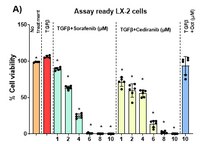SCCAR10064-1VL Sigma-AldrichAssay Ready LX-2 Human Hepatic Stellate Cell Line
LX-2 cells retain key features of human hepatic stellate cells including cytokine signaling, retinoid metabolism, and fibrogenesis. **SCCAR10064 cells are non-expandable and packaged at high density to enable readiness for hepatic fibrosis and other relevant assays without propagation or passage.
More>> LX-2 cells retain key features of human hepatic stellate cells including cytokine signaling, retinoid metabolism, and fibrogenesis. **SCCAR10064 cells are non-expandable and packaged at high density to enable readiness for hepatic fibrosis and other relevant assays without propagation or passage. Less<<Productos recomendados
Descripción
| Replacement Information |
|---|
| Description | |
|---|---|
| Catalogue Number | SCCAR10064-1VL |
| Description | Assay Ready LX-2 Human Hepatic Stellate Cell Line |
| Overview | Hepatic stellate cells are a major cell type responsible for liver fibrosis following their activation into fibrogenic myofibroblast-like cells in diseases such as chronic alcoholism, hepatitis B and C, fatty liver disease, obesity and diabetes. There is an increasing need for renewable cell culture models that faithfully recapitulate their in vivo phenotype, particularly for human studies. LX-2 was generated by immmortalization of primary human hepatic stellate cells with the SV40 large T antigen followed by selective culture of early passaged cells in low serum media conditions. Immortalized LX-2 was established by Xu et al to overcome issues of culture variability and to provide a stable and unlimited source of human hepatic stellate cells that are homogeneous. These cell lines have been extensively characterized and retain key features of cytokine signaling, neuronal gene expression, retinoid metabolism, and fibrogenesis, making them highly suitable for culture based studies of human hepatic fibrosis. |
| Alternate Names |
|
| Background Information | This product contains cells sold under a consumable label license and which may not be propagated. For the equivalent expandable, bankable LX-2 cell line, please see SCC064. Hepatic stellate cells are an essential cell phenotype responsible for liver fibrosis following their activation to fibrogenic myofibroblast-like cells in diseases such as chronic alcoholism, hepatitis B and C, fatty liver disease, obesity and diabetes. There is an increasing need for renewable cell culture models that faithfully recapitulate their in vivo phenotype, particularly for the development of therapeutics. The LX-2 cell line was generated by immmortalization of primary human hepatic stellate cells with the SV40 large T antigen followed by selective culture of early-passage cells in low serum media conditions. |
| References |
|---|
| Product Information | |
|---|---|
| Components |
|
| Quality Level | MQ100 |
| Biological Information | |
|---|---|
| Cell Line Type |
|
| Physicochemical Information |
|---|
| Dimensions |
|---|
| Materials Information |
|---|
| Toxicological Information |
|---|
| Safety Information according to GHS |
|---|
| Safety Information |
|---|
| Product Usage Statements | |
|---|---|
| Quality Assurance | • Cells are tested by PCR and are negative for Hepatitis A, B, C and HIV-1 & 2 viruses. • Cells are negatrive for mycoplasma contamination. |
| Usage Statement |
|
| Storage and Shipping Information | |
|---|---|
| Storage Conditions | LX-2 cells should be stored in liquid nitrogen. |
| Packaging Information | |
|---|---|
| Material Size | 1 vial |
| Transport Information |
|---|
| Supplemental Information |
|---|
| Specifications |
|---|
| Global Trade Item Number | |
|---|---|
| Número de referencia | GTIN |
| SCCAR10064-1VL | 04065270631497 |
Documentation
Assay Ready LX-2 Human Hepatic Stellate Cell Line Ficha datos de seguridad (MSDS)
| Título |
|---|
Ficha técnica
| Cargo |
|---|
| Data Sheet-SCCAR10064 |









